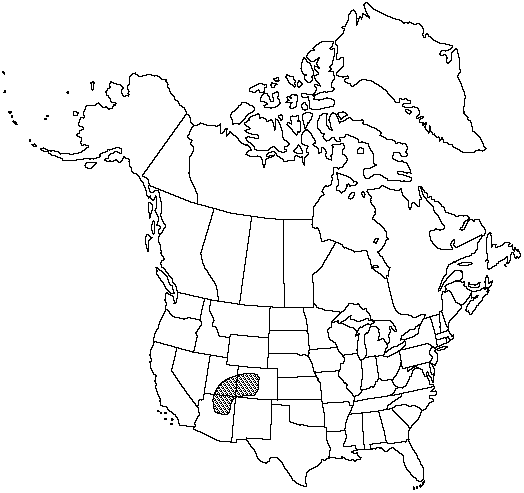Difference between revisions of "Botrychium echo"
Amer. Fern J. 73: 57. 1983.
FNA>Volume Importer |
imported>Volume Importer |
||
| (7 intermediate revisions by 2 users not shown) | |||
| Line 8: | Line 8: | ||
}} | }} | ||
|common_names=Echo moonwort | |common_names=Echo moonwort | ||
| + | |special_status={{Treatment/ID/Special_status | ||
| + | |code=E | ||
| + | |label=Endemic | ||
| + | }}{{Treatment/ID/Special_status | ||
| + | |code=C | ||
| + | |label=Conservation concern | ||
| + | }} | ||
|basionyms= | |basionyms= | ||
|synonyms= | |synonyms= | ||
| Line 17: | Line 24: | ||
}}<!-- | }}<!-- | ||
| − | --><span class="statement" id="st- | + | --><span class="statement" id="st-undefined" data-properties=""><b>Trophophore </b>stalk 0–4 mm; blade shiny green, broadly oblong to oblong-deltate, 1–2-pinnate, to 4 × 3cm, firm. <b>Pinnae</b> to 4 pairs, spreading or only moderately ascending, well separated, distance between 1st and 2d pinnae not or slightly more than between 2d and 3d pairs, basal pinna pair approximately equal in size and cutting to adjacent pair, oblanceolate to linear-spatulate, ± parallel-sided, divided to tip, shallowly lobed or rarely 2-cleft, basal pinna cleft into single basiscopic projection and large acroscopic projection, margins entire, apex acute, venation pinnate. <b>Sporophores</b> 1–2 pinnate, 1–2 times length of trophophore rachis. <b>2n</b> =180.</span><!-- |
-->{{Treatment/Body | -->{{Treatment/Body | ||
| + | |phenology=Leaves appearing in June, dying in September. | ||
|habitat=Grassy mountain slopes, snow fields, road ditches, and sand dunes | |habitat=Grassy mountain slopes, snow fields, road ditches, and sand dunes | ||
|elevation=2500–3700 m | |elevation=2500–3700 m | ||
|distribution=Ariz.;Colo.;Utah. | |distribution=Ariz.;Colo.;Utah. | ||
| − | |discussion=<p>Botrychium echo is one of four moonwort species that commonly produce clusters of minute, spheric gemmae at the root bases. This species tends to have a reddish brown stripe along the common stalk from the base of the trophophore stalk.</p><!-- | + | |discussion=<p><i>Botrychium echo</i> is one of four moonwort species that commonly produce clusters of minute, spheric gemmae at the root bases. This species tends to have a reddish brown stripe along the common stalk from the base of the trophophore stalk.</p><!-- |
--><p>Of conservation concern.</p> | --><p>Of conservation concern.</p> | ||
|tables= | |tables= | ||
| Line 33: | Line 41: | ||
-->{{#Taxon: | -->{{#Taxon: | ||
name=Botrychium echo | name=Botrychium echo | ||
| − | |||
|authority=W. H. Wagner | |authority=W. H. Wagner | ||
|rank=species | |rank=species | ||
| Line 40: | Line 47: | ||
|basionyms= | |basionyms= | ||
|family=Ophioglossaceae | |family=Ophioglossaceae | ||
| + | |phenology=Leaves appearing in June, dying in September. | ||
|habitat=Grassy mountain slopes, snow fields, road ditches, and sand dunes | |habitat=Grassy mountain slopes, snow fields, road ditches, and sand dunes | ||
|elevation=2500–3700 m | |elevation=2500–3700 m | ||
| Line 46: | Line 54: | ||
|publication title=Amer. Fern J. | |publication title=Amer. Fern J. | ||
|publication year=1983 | |publication year=1983 | ||
| − | |special status= | + | |special status=Endemic;Conservation concern |
| − | |source xml=https:// | + | |source xml=https://bitbucket.org/aafc-mbb/fna-data-curation/src/2e0870ddd59836b60bcf96646a41e87ea5a5943a/coarse_grained_fna_xml/V2/V2_481.xml |
|genus=Botrychium | |genus=Botrychium | ||
|subgenus=Botrychium subg. Botrychium | |subgenus=Botrychium subg. Botrychium | ||
|species=Botrychium echo | |species=Botrychium echo | ||
| − | |||
| − | |||
| − | |||
| − | |||
| − | |||
| − | |||
| − | |||
| − | |||
| − | |||
| − | |||
| − | |||
| − | |||
| − | |||
| − | |||
| − | |||
| − | |||
| − | |||
| − | |||
| − | |||
| − | |||
| − | |||
| − | |||
| − | |||
| − | |||
| − | |||
| − | |||
}}<!-- | }}<!-- | ||
-->[[Category:Treatment]][[Category:Botrychium subg. Botrychium]] | -->[[Category:Treatment]][[Category:Botrychium subg. Botrychium]] | ||
Latest revision as of 20:23, 5 November 2020
Trophophore stalk 0–4 mm; blade shiny green, broadly oblong to oblong-deltate, 1–2-pinnate, to 4 × 3cm, firm. Pinnae to 4 pairs, spreading or only moderately ascending, well separated, distance between 1st and 2d pinnae not or slightly more than between 2d and 3d pairs, basal pinna pair approximately equal in size and cutting to adjacent pair, oblanceolate to linear-spatulate, ± parallel-sided, divided to tip, shallowly lobed or rarely 2-cleft, basal pinna cleft into single basiscopic projection and large acroscopic projection, margins entire, apex acute, venation pinnate. Sporophores 1–2 pinnate, 1–2 times length of trophophore rachis. 2n =180.
Phenology: Leaves appearing in June, dying in September.
Habitat: Grassy mountain slopes, snow fields, road ditches, and sand dunes
Elevation: 2500–3700 m
Distribution

Ariz., Colo., Utah.
Discussion
Botrychium echo is one of four moonwort species that commonly produce clusters of minute, spheric gemmae at the root bases. This species tends to have a reddish brown stripe along the common stalk from the base of the trophophore stalk.
Of conservation concern.
Selected References
None.